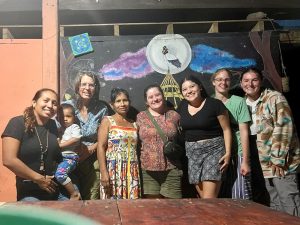Hello, I’m Carolyn Dilbeck, a journalism student from Valparaiso University, and I’m so pleased to have you along with me as I document my time here in Costa Rica! During these next few months, I hope I can provide some insight into the culture and what life is like. My first month here has been simultaneously overwhelming and exciting, with having to adjust to the new language and culture, but I have had a wonderful support system in my host family and program director. It has definitely been a journey of learning, exploration, and growth, and many wonderful memories made along the way. For my first blog post, I wanted to highlight what was for me the most memorable aspect of our program’s first excursion out of the San Jose area last weekend. We recently had the opportunity to visit the Nazo indigenous community in Panama. Despite the intense humidity and mosquitoes, we had a wonderful time and learned a lot about their culture and way of life.
We stayed in a village of the Boca del Toros region with an organization of women dedicated to tourism and education. They were incredibly kind and hospitable, and went out of their way to make us feel welcome, and generously shared their homes with us. We had the opportunity to try some of the foods grown on their “finca” or farm, including several types of tropical fruits and vegetables I’d never heard of before. We had the opportunity to see how they were grown as well. The community we went to employs traditional methods of agriculture, such as rotating locations and growing a variety of different types of plants in close proximity for the ecological benefits. This allows the group to be relatively self-sufficient, and allows them to live in harmony with the surrounding rainforest ecosystems. This was especially interesting and inspiring or me, since sustainable agriculture is a topic I’ve recently become interested in.
However, their simple and down to earth way of life has increasingly been threatened by the government’s intrusion, ironically in the name of environmental preservation. For example, one of the women in the organization explained that they had reluctantly allowed the Costa Rican government to build a hydroelectric dam on their land, with the promises that their villages would reap the benefits of it. However, that has not been the case, and meanwhile they are no longer able to fish there. Hunting, another traditional source of food for the tribe, has also been threatened. One of the young men in the tribe took us on a hike through the jungle and described that he was no longer able to hunt there as his ancestors had done due to stricter regulations protecting the wildlife. While beneficial, it’s clear that the government’s approaches have harmed the very people who are doing the most to care for the land.
Overall, it was both an incredibly enjoyable and informative experience. It was a reminder of how precious and beautiful our natural environments are, but also of our responsibility to protect it in a way that works for the long term and doesn’t harm others. For this, I can’t think of a better model than the Nazo community. Their example has never been more important than now. It truly gave me a new perspective, and inspired me to continue to work toward a simpler, more sustainable lifestyle.

Leave a Reply